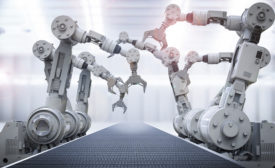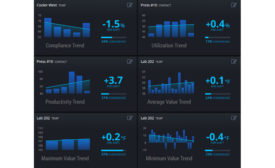Home » Keywords: » manufacturing trends
Items Tagged with 'manufacturing trends'
ARTICLES
Study: CEO confidence declines to lowest level in a decade
CEOs have grown more pessimistic about current economic conditions, with only 8% saying conditions are better compared to six months ago, down from 13% last quarter.
October 4, 2019
Ohio State University opens artificial intelligent manufacturing lab
The AIMS lab was developed with input from industry, national defense and energy laboratories and university experts.
September 30, 2019
Survey on U.S. manufacturing shows U.S. brands remain strong
The national survey examines Americans’ perceptions about the manufacturing industry, including sustainability and tariffs, as well as whether they plan to pursue a career in this sector.
September 30, 2019
Study: Transportation, logistics job openings rise 49% in June
As increased demand for shipping from the rise of e-commerce tangles with an aging trucking workforce, demand for workers and is rising.
July 8, 2019
Study: 20M manufacturing jobs will be displaced by robots by 2030
Trends suggest the global stock of robots will multiply even faster in the next 20 years, reaching as many as 20 million by 2030.
June 27, 2019
Study: 3PL services among top manufacturing trends in 2019
Looking forward to 2019, some markets to keep an eye on entail plastic recycling services, 3PL services and sensors.
January 15, 2019
The evolution of HPP
The evolution of HPP is one that includes enhanced packaging labels, improved consumer education and expanded reach.
January 14, 2019
Survey shows 61% of Americans prefer products Made in America
While a majority of respondents reported they were very or somewhat familiar with the manufacturing industry (76%), the survey reveals Americans are largely unaware of the robust state of the manufacturing sector.
October 1, 2018
Get our new eMagazine delivered to your inbox every month.
Stay in the know on the latest food and beverage manufacturing markets.
SUBSCRIBE TODAYCopyright ©2024. All Rights Reserved BNP Media.
Design, CMS, Hosting & Web Development :: ePublishing








